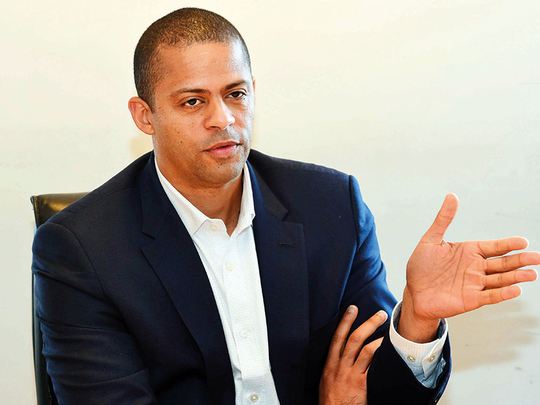
Dubai: Applications services are the future as most businesses across the world are becoming digital to match the speed. The currency of digital transformation is applications, president and CEO of F5 Networks told Gulf News.
In the future, Francois Locoh-Donou said that corporate applications will become critical and tangible assets of the companies just like cash and staff is tangible assets now. The services that make these applications perform better, smarter and safer will be the fabric of many companies.
He said that digital transformation is accelerating as most of the customers have the strategies because they want to move faster in the marketplace. The companies that have been successful in the last 15 years are able to do some research on their customers, analyse their customer behaviour and modify their products as a result of the transformation in a very fast cycle.
- Francois Locoh-Donou | CEO of F5
“We see a lot of digital transformation initiatives from companies that want to collapse the cycle and respond to customer needs in real time, just like the cloud players are doing, across retail, manufacturing, financial and governments. Speed is the big currency for customers,” he said.
In Dubai, he said that customers are also taking these initiatives with some IoT projects taking place.
“We are also seeing automation and orchestration of IT systems and processes in a bid to optimise IT and be able to respond to internal needs of application developers faster. Organisations are moving to the cloud to deliver the speed necessary for digital transformation projects,” he said.
Moreover, he said the speed and scale required from the digital economy are moving IT off-premises and into the cloud. Automation and orchestration are growing in importance, regionally and globally. There is some real money going into the adoption of these technologies. Most customers are implementing multi-cloud strategies.
He said there are visible tensions in various organisations between the desire for speed and, at the same time that leads to security.
“For a lot of CIOs that is creating is a big tension. Digital transformation accelerates that tension. The opportunities are enormous. It enables to understand the customer better and release products much faster, ability to develop more applications, to do more with less money,” he said.
Among corporate application services, he said that security is growing.
According to F5’s latest report, security held the top position in the list of services that organisations consider mandatory to deploy in support of their apps.
“With more breaches comes less confidence in security solutions and strategies to protect the ever-increasing amount of personal data that organisations process and hold. And while threats affect applications in every environment, organisations continue to be less confident in their ability to protect applications in public cloud or multi-cloud environments,” the report said.
Locoh-Donou said that public and private cloud adoption is accelerating and lots of organisations are adopting the multi-cloud strategy. The original fear about public cloud has gone way and people are getting more comfortable now, moving apps. People are investing a lot in creating automated public cloud environment.
In the region, he said that public cloud adoption is not there yet, it is in early days but the appetite for recognition is coming. SMEs are faster in adopting the cloud as they don’t have the skills and the budget. So, they welcome the opportunity to outsource it to a cloud provider.
“One of the reasons that F5 is deployed in the public cloud a lot is because it is able to provide consistency for security levels between on-premises and applications in the cloud,” he said.
Big cloud providers are not able to meet the requirements of big companies, whether it is regulation or internal policy requirements. For these reasons, he said that companies like us bring an added layer of security that matches on-premises environment.
When asked whether there is a need for a new IT security architecture, he said: “I don’t know whether any single IT security architecture will solve all the problems. You will see more and more on applications security. There has been a lot of focus on end point security, network security and perimeter security. We don’t feel there is a higher focus on application security and this is where we are specialised in. The DNA of F5 is the knowledge of applications and applications forensic.”
Sometimes regulations will force new architectures to be implemented, he said.
However, “what we are seeing across verticals now is that lot of customers have got mandates. Any application, whether it is web or third-party, needs to be protected by Web Application Firewall.
Some of the recent breaches in the financial sectors have made payment houses to force banks to implement multiple zones of firewalls in the architecture.
“We will see the evolution of architectures. There is a need for more collaboration between vendors and technology companies. I don’t think there is a single recipe for one global architecture,” he said.












